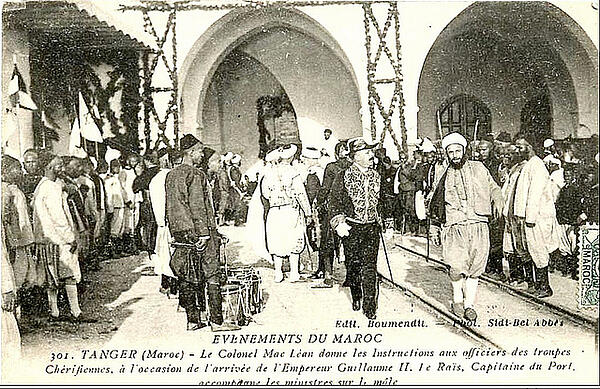The First Moroccan Crisis
The First Moroccan Crisis was a dispute largely between Germany and France over who should control Morocco. Several other Great powers and nations also took an interest and sided with either Germany or France. It was a long-term cause of World War One because it increased tensions in Europe.
Morocco was unique in 1905. Whereas most of the other African states were occupied by a European power, Morocco was still independent. This made it the subject of European attempts at control.
France first claimed a stake over Morocco in 1899. After various agreements with Italy, Spain and Britain, France was allowed a mandate over the territory. An agreement with the British came after Théophile Delcassé, the French Foreign Minister, agreed to renounce any claims over land in Egypt. The only European power yet to agree was Germany.

Germany’s politicians were concerned about French expansion in North Africa. As a way of preventing it, the German Chancellor Prince von Bülow attempted to encourage the Moroccan Sultan to oppose the French. In February 1905, Aziz gathered his supporters around him and told him that with Allah, as well as the new found German friendship, they could defeat the French.
Support for Aziz was split into two camps. On the one side was France, Spain and Italy, all of whom supported the French reform programme for Morocco. On the other was Germany. Bülow demonstrated the extent of his support for Aziz by organising for Wilhelm II to visit Tangier.
Wilhelm was concerned over his safety and was reluctant to visit Tangier
Wilhelm rode to the German Legation and announced that he he wanted Morocco to stay as an independent state. He called on the French to safeguard Germany’s interests in Morocco.
These threats horrified France. In London the government was also angered by the German move. It was not willing to accept a German port in Morocco because it could potentially become a naval port. Edward VII was also irritated by the risky publicity stunt by WIlhelm - his nephew - in Tangier. Edward promised Paris his support.
An international conference was organised in Morocco in May 1905. Delcassé resigned from the French government in protest as he believed that Germany was allowed too much influence. He believed that whatever happened, Germany would end up with influence over Morocco.
At first it seemed like Germany had the upperhand because they were negotiating with the French Prime Minister, who was inexperienced. But French PM Maurice Rouvier was supported by Britain and the US. Lord Lansdowne at the British Foreign Office warned the German ambassador in London that he could not guarantee how Britain would react if Germany were to attack France.
Backed into a corner, Germany had no choice but to negotiate with the French over the conference. She also promised to recognise the “special interests” of France in Morocco. Germany and France signed the pre-conference agreement on 8 July 1905. The conference was planned for January 1906.
However, the Ageciras Conference only offered a temporary solution. The First Moroccan Crisis had deepened divisions in Europe and consolidated the positions of the Triple Alliance and Triple Entente.
See also: Theophile Delcasses
MLA Citation/Reference
"The First Moroccan Crisis". HistoryLearning.com. 2024. Web.
